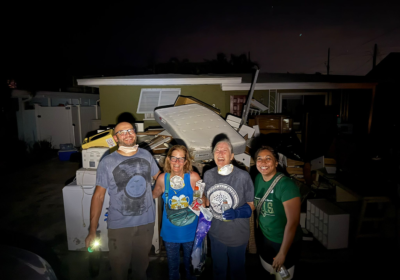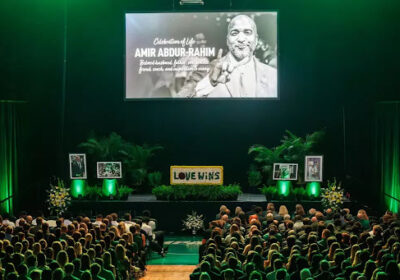DEI cuts, DeSantis’ education agenda discussed at USF debate

A crowd of 105 people signed in to see a debate on a topic that still raises questions among students and faculty at USF: Should public funds go to diversity programs in higher education?
Richard Corcoran, president of New College and former Florida House speaker, said he believes it shouldn’t. Ameshia Cross, director of Communications for The Education Trust, said she believes it is essential.
Related: DEI’s future st USF: The question on everyone’s mind
Both speakers took turns and waited for the moderator to open space for rebuttals, before intervening. Four University Police (UP) officers were present to ensure everyone’s safety during the event.
Steamboat Institute, in partnership with the USF organizations such as First Amendment Forum, College Democrats and College Republicans, hosted the debate Wednesday evening at the Marshall Student Center (MSC) Oval Theatre.
Carrie Sheffield, senior policy analyst at Independent Women’s Voice organization, moderated the debate.
The debate focused on Gov. Ron DeSantis’ education agenda and the future of diversity, equity and inclusion (DEI) in higher education.
In his opening statement, Corcoran said two “crusty white guys” were considered for the debate before Cross was invited. He said Cross being a “beautiful Black lady” was what he expected.
Corcoran said terms such as DEI are “great,” but they’re used in an inappropriate way.
He compared DEI to “Animal Farm,” George Orwell’s novel, because he said the end of the book shows that all animals are equal, but some are more equal than others.
Cross said the democracy of the U.S. is one that is very different from across the globe because the country does not have a homogenous society.
“We are one that is built on all different cultures, religious backgrounds, ethnicities, points of view, what we look like and where we come from,” Cross said. “What DEI aims to do is ensure that individuals, regardless of their background, do not face discriminatory practices.”
Part of the college experience is to accept change, to lean in on the uncomfortable and to learn things that can’t be taught at home, Cross said.
There was a Q&A after the debate, during which students sent out questions through a form link that was passed around through a QR code. Sheffield said she received 66 audience questions.
Corcoran said he agrees with DeSantis that DEI is “discrimination, absolute exclusion and indoctrination.”
Cross said, in rebuttal, that DEI conversations matter because inequities continue to persist and make it harder for Black people to reach full equity, individualism and American values.
“Black history is American history,” Cross said. “We can’t talk about slavery without talking about the impact that it had on the Black community and the economic structure that was built off the backs of Black people in this country.”
The moderator asked Corcoran if he thought racism existed in America. Corcoran said he agrees racism exists in America and can only be fixed with a general “change” in the educational system.
Three students, sitting in the middle section of the theater, started an argument of their own regarding the moderator’s question. Moments later, the students were hushed by Tyler Tone, president of the First Amendment Forum, sitting in the row in front of them.
Two of the students left after the interaction.
Concoran said that family systems affect people’s education because those who graduate with two parents at home are “90% likely to be successful,” and at some point that metrics matter.
Cross shared that she wasn’t raised by two parents and still graduated with a double major during her closing statements.
Attendees and speakers headed to MSC 3705 for a Meet & Greet reception with food and drinks, where they all had conversations as a follow-up to the debate.
Both Cocaran and Cross answered student questions in a more informal setting over Publix fried chicken.
Cross said cultural student organization meetings work better when they also have students from outside that culture, because there are no “exclusionary practices associated with building towards equity.”
“You don’t have to teach Black students a lot of history about Black people because we’ve already been there and done that,” Cross said. “We were born Black and will die Black unless some sculpted Michael Jackson thing happens.”
Additional reporting by Julia Saad






